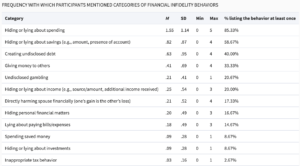When the word “infidelity” comes up, most people’s minds go straight to physical, sexual cheating. However, there is another type of infidelity that many do not think of. Money infidelity. This happens when a spouse spends money, withholds money, saves/hides money elsewhere, or borrows money without the other spouse knowing. While this has probably been going on since the beginning of money, technology has made money infidelity much easier. Banking is done online, transactions can be completed online, and moving money around can be accomplished online. And with statements coming to an email and not in the mail, the other spouse can be in the dark for decades.
*Journal of Consumer Research, Volume 47, Issue 1, June 2020, Pages 1–24
The above table is some scary data about how often money infidelity occurs and how prevalent it is! You can find the entire study here.
What can cause money infidelity?
Having an affair
Yes, I’m going to this one first. Physical/sexual infidelity and money infidelity could have a related correlation. When one is having an affair, usually expenses happen that can’t be easily explained by the spouse. More dinners? Hotels? Vacations? Gifts?
Addiction
Any kind of addiction – shopping, drugs, alcohol, gambling, sex, overeating, etc – will cause money to go down the drain. With addiction, there is shame that goes along with it. For this reason, the shame, money is often hidden from the other spouse. The addict will hide and borrow money without the other’s knowledge. One thing to note is that sometimes when one finally kicks one addiction, it could be replaced by another addiction equally financially devastating.
Difference in goals and desires
What can happen if one spouse wants to put all extra money toward debts, but the other wants more immediate gratification? This is an example of a difference in goals and desires. Another example would be a difference in the desire to save for retirement. One spouse may want a large nest egg waiting while the other may not see the need for such a large sum.
Survival instinct
This is a more extreme version of the above difference in goals and desires. Sometimes you just can’t trust your spouse to make sound financial decisions. This can be because your values don’t line up or he/she is spending money on things that aren’t in line with where you want to be. Unfortunately, sometimes you can’t talk with the other people calmly and logically. Taking a portion of money and saving it somewhere else may be the only way the spouse can protect himself/herself and set up a stable future.
3 Signs of money infidelity
You find credit cards and/or statements you know nothing about
This is a big one. If you find statements or random cards laying about, this could be a huge sign of money infidelity. Think about this: Who is going to pay off that balance? You still have the same household income, but money will be going to a place you did not budget for. Along this same line, if you had a joint account and find yourself removed from it, that’s another sign your spouse is spending money he or she doesn’t want you to know about.
NEEDS to get the mail
I put “needs” in all caps because s/he doesn’t want you to see the statements or new cards coming in the mail. The same can work for email (since not all statements arrive via mail anymore). If you discover a new email address for your spouse, s/he may have financial transactions to hide from you.
Your spouse starts buying you gifts for no reason
This is sometimes a less common sign, but the spouse who is hiding can feel guilty. To assuage that guilt, he or she may start buying you gifts “just because”.
Actions to take if you suspect money infidelity
Communication is key
This prevents money infidelity from entering into your marriage in the first place. However, if you are suspicious, ask your spouse (make sure you are physically safe!). Having a calm discussion about this can air out any grievances or problems. Tell him/her how you feel. If you need to do this with a counselor, find one to help mediate the discussion and help formulate solutions.
Agree on a plan
Moving forward, have money dates with your spouse. This opens lines of communication and discussion. No, you may not agree on every single financial transaction, but when there is communication, there can also be compromise and agreements.
Final Thoughts
Intentionally not disclosing where your all money is and where it is all going is money infidelity. This post is to get you thinking, but the bottom line is, you know your spouse better than anyone. Ask the difficult questions if you are suspicious. Letting this go on will only hurt more (both financially and emotionally) in the long run.
Do you need help taking back control of your money instead of your money controlling you? Schedule your free consultation with us and see if we are a good fit to work together. Don’t live another day with the money stress and anxiety you carry around!





